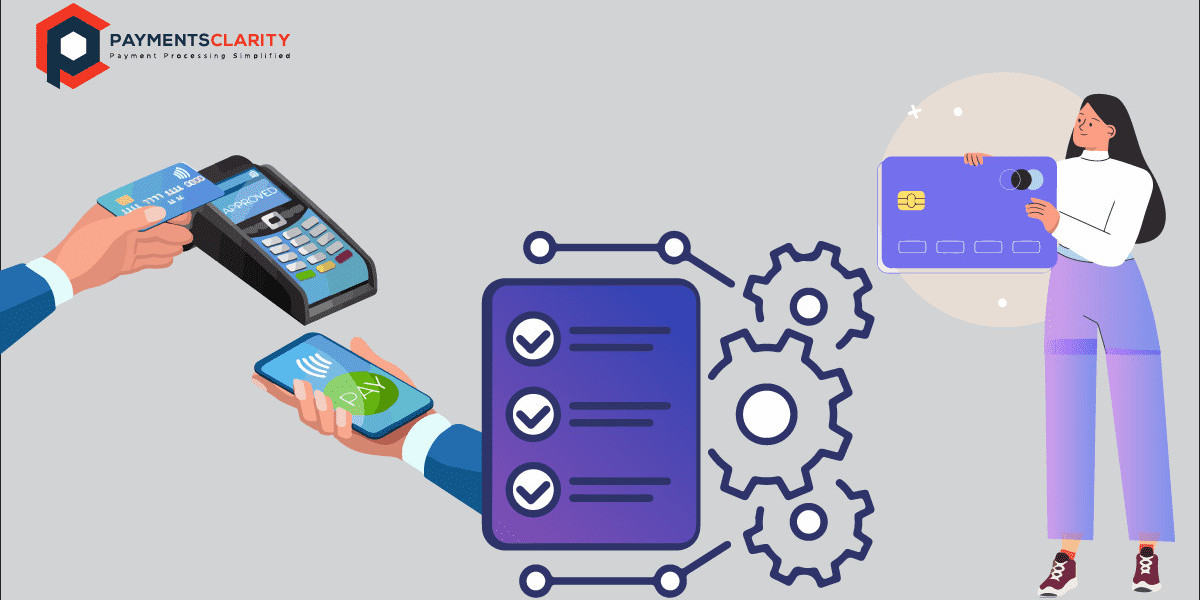How does credit card processing work?
Credit card processing is a complex system that allows businesses to accept and process payments made with credit cards. Here is a simplified explanation of "how credit card processing typically works":
Customer initiates payment: The customer provides their credit card information (card number, expiration date, and CVV code) to the merchant during a purchase.
Merchant's point-of-sale (POS) system: The merchant enters the customer's payment information into their POS system, which may be a physical terminal or "an online payment gateway".
Authorization request: The merchant's system sends an authorization request to the credit card network (e.g., Visa, Mastercard, American Express) or "the merchant's payment processor". The request includes the transaction amount, merchant identification, and the customer's card details.
Credit card network or payment processor: The authorization request is forwarded to the customer's credit card issuer (the bank or financial institution that issued the card) through the credit card network or "payment processor".
Card issuer response: The card issuer receives the authorization request, verifies the customer's account details, and checks if there are sufficient funds available to cover the transaction. They also perform security checks to ensure the transaction is not fraudulent. Once the checks are completed, the issuer sends an authorization code or decline response back to the merchant's system.
Authorization response: The merchant's system receives the response from the card issuer. If the response is an authorization code, it means the transaction is approved. If the response is a decline, the transaction is rejected.
Completion of the transaction: If the transaction is approved, the merchant can proceed to complete the sale. The customer's card is charged, and the merchant provides the goods or services to the customer. For online transactions, the "payment gateway" securely captures the customer's funds.
Settlement: At the end of each business day or a specified settlement period, the merchant batches the authorized transactions and sends them to the acquiring bank or payment processor. The acquiring bank facilitates the transfer of funds from the customer's card issuer to the merchant's bank account.
Funding and fees: The acquiring bank deposits the funds from the authorized transactions into the merchant's account, usually net of any fees charged by the "payment processor" and interchange fees set by the credit card networks.
Statement and reconciliation: The merchant receives a statement detailing the processed transactions and associated fees. They reconcile the statement with their own records to ensure accuracy and track their financial transactions.
It's important to note that this is a simplified overview, and there may be additional steps or variations in the process depending on the "specific payment gateway", merchant account provider, or payment processor involved.
Merchant services online credit card processing?
Merchant processing, also known as payment processing or "credit card processing", refers to the handling of electronic payment transactions between merchants (businesses) and customers. It involves the authorization, capture, and settlement of payments made through various payment methods, including credit cards, debit cards, and electronic funds transfers (EFTs).
"Merchant processing" enables businesses to accept and process customer payments securely and efficiently. It typically involves the following key entities:
Merchant: The business or seller that offers goods or services and wishes to receive payment from customers.
Acquiring Bank: The financial institution that partners with "the merchant to provide payment processing services". The acquiring bank may also be referred to as the merchant bank or acquiring processor.
Payment Gateway: A technology provider that acts as an intermediary between the merchant's website or point-of-sale system and the acquiring bank. The "payment gateway" securely transmits payment data and handles the authorization process.
Card Associations: Organizations such as Visa, Mastercard, American Express, and Discover that establish rules and standards for payment cards. They facilitate the flow of funds between the cardholder's issuing bank and the acquiring bank.
The merchant processing workflow typically involves the following steps:
Payment Initiation: The customer initiates a payment by presenting a payment card or choosing an electronic payment method (e.g., bank transfer) at the point of sale (POS) or online checkout.
Authorization: The payment details are securely transmitted to the acquiring bank via the "payment gateway". The acquiring bank verifies the customer's account status, funds availability, and fraud risk. If approved, the authorization is sent back to the merchant, allowing the transaction to proceed.
Clearing and Settlement: After receiving the authorization, the merchant submits the authorized transactions to the acquiring bank for clearing and settlement. The acquiring bank collects funds from the cardholder's issuing bank and transfers them to "the merchant's bank account", minus processing fees.
Funding: The acquiring bank deposits the settled funds into the merchant's designated bank account within a predetermined timeframe, typically within a few business days.
Reporting and Reconciliation: Merchants can access reporting tools or receive statements from their acquiring bank, which provide detailed transaction information and facilitate the reconciliation of sales and deposits.
"Merchant processing services" may also include additional features like chargeback handling, recurring billing, fraud detection and prevention, and multi-currency support, depending on the provider and the needs of the business.
It's important for merchants to partner with reputable merchant processors or "payment service providers" that offer secure, reliable, and cost-effective solutions tailored to their business requirements.
What is Credit Card Processor
A credit card processor, also referred to as a payment processor, plays a crucial role in facilitating "electronic transactions between merchants" and customers when credit or debit cards are used for payment. Here's how the process typically works:
Customer initiates a transaction: The customer selects products or services and chooses to pay with a credit or debit card.
Merchant submits transaction: The merchant sends the transaction details, including the card information, to the credit card processor.
Authorization request: The "credit card processor" forwards the transaction details to the customer's bank (issuing bank) through the relevant payment network (e.g., Visa, Mastercard).
Issuing bank approves or declines: The issuing bank receives the authorization request and checks whether the customer has sufficient funds or credit limit available. The issuing bank sends an approval or decline response back to the credit card processor.
Transaction authorization: Upon receiving the response from the issuing bank, the "credit card processor" relays the authorization or decline status to the merchant.
Merchant completes the transaction: If the transaction is authorized, the merchant proceeds to complete the sale by providing the goods or services to the customer.
Settlement: At the end of the day or a specified period, "the credit card processor initiates" the settlement process. It transfers the funds from the customer's bank to the merchant's bank (acquiring bank) for the authorized transactions, minus any applicable fees.
Credit card processors offer a range of services beyond transaction processing, such as fraud detection, chargeback handling, and reporting. They charge fees for their services, usually based on a percentage of the transaction value or a flat fee per transaction. It's important to note that the specific processes and parties involved may vary slightly depending on the payment network, country, and the agreements between the merchant, acquiring bank, and "credit card processor".
#Best Online Casino Payment Gateway | #Payment Processor | #Accepting payment online |
#Online payment processors | #Best Credit card processing | #Merchant processing | #Credit card processing | #Credit card processor | #Merchant account in usa | #What is an merchant account |
#Merchant account for company | #High risk merchant processing accounts |
https://www.paymentsclarity.com/our-services/credit-card-processing
https://www.paymentsclarity.com/reliable-online-casino-payment-gateway/
https://www.paymentsclarity.com/do-you-accept-credit-cards/
https://www.paymentsclarity.com/payment-processing-for-online-casino/


